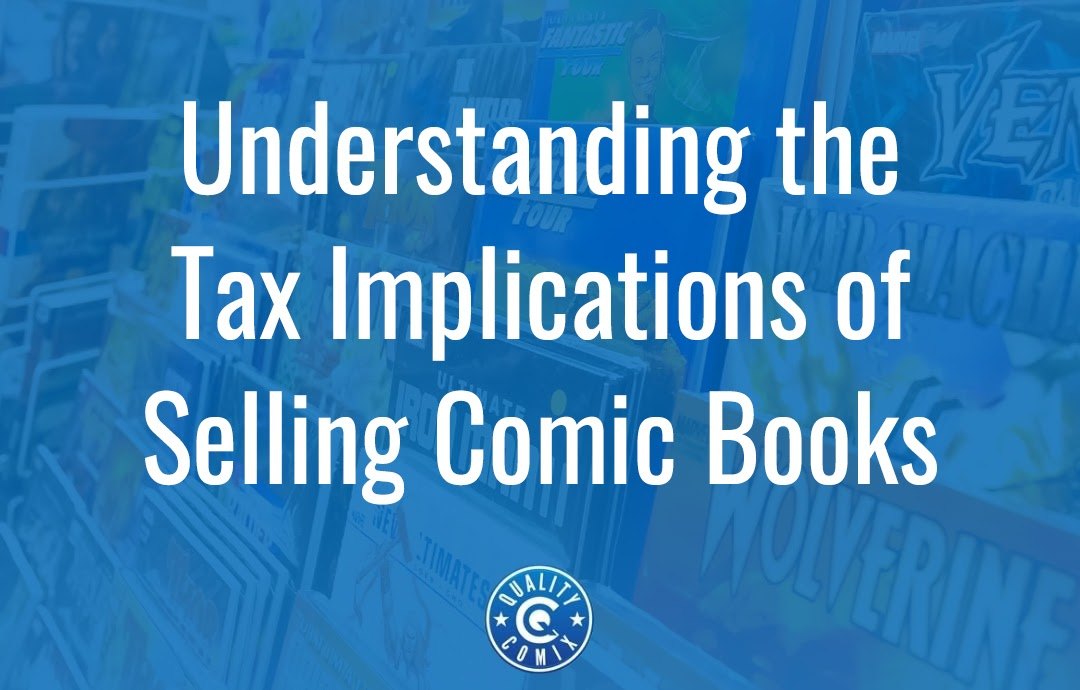
Comics are a hobby, but they're also an investment. Many people nationwide, and even worldwide, buy comics not just to enjoy them but to resell them for a profit later on down the line.
Sadly, the government wants to take its pound of flesh whenever it can, and one of the main ways they do that is on taxes. When you sell your comics, whether it's a couple of valuable keys or a whole collection, you're going to have to be mindful of taxes. The question is, which taxes? How are comic sales taxed?
There's no simple answer, so let's dig in.
Before we get too deep, it's worth mentioning that taxes are incredibly complicated. More importantly, I'm a comic store owner and comic fan, not an accountant or tax specialist. I do my best to research these kinds of topics, but always, always verify with a tax professional before making significant financial decisions. Just keep that in mind as you read on.
Table of Contents
Legally Speaking, What Are Comics?
First, we need to address something important: What even are comics?
I don't mean what the difference is between comics and graphic novels, comics and sequential art, comic books versus anthologies, or any of those other definitions. Those are important for classification and library science, but they don't bear any relevance to finance.
What I mean here is the definition of comics according to the IRS. Fortunately, there's a relatively simple answer here: they're collectibles. Collectibles are a class of asset that can be held and later sold for a profit and are distinct from things like securities and other classes of assets.

The IRS specifically classifies comics as collectibles and collectibles as capital assets. The category as a whole is "any tangible personal property that the IRS determines is a collectible," which is a pretty circular definition. Fortunately, few people will argue that comics aren't collectibles, at least not when it comes to trying to convince the IRS of that fact.
Adding another layer to the definition is that collectibles "have specific intrinsic value." That is, the value isn't determined by the relationship of the item to the person buying or selling it (as in sentimental value) but rather by the value inherent to the item on the open market. Artwork, precious metals, gemstones, stamps, and coins are all other kinds of collectibles. You can see how comics fit right in.
Now, here comes another wrinkle: the way you're taxed on the sale of comics differs depending on how you're selling the comics.
Inheritance, Investment, Business
There are generally three scenarios where you may be selling comics.
The first is that you've inherited a collection. You don't really care much about comics as a whole, or maybe you do, but you need money more than you need your dad's old books, so you go to sell them. Maybe you will list them on eBay, maybe you will take them to a local comic shop, or maybe you will sell them to us. Whatever the case may be, you've inherited an asset, you're selling that asset, and you get money out of the deal.
The second scenario is when you've bought comics over the course of years and you've held onto them. You've watched the value grow, and now you've decided it's time to sell. You've watched the market, and you know how valuable your books are, so you spend the time to sell them at competitive rates and pocket the money to use on something like a wedding, a family vacation, or retirement.

The third scenario is when you're a chronic comic flipper. You buy comics, you sell comics, you pocket the difference. Some of those comics are only in your hands for a few days or a few weeks; others sit in your inventory for months or years before finding the right buyer. Either way, you have a constant flow of transactions, both buying and selling.
These are generally the three different classes of transactions you can find when selling comics, and all three of them are taxed differently.
Tax Implications on Inherited Comics
First, let's talk about when you inherit a comic book collection. There are three potential taxes that could come into play here, but 99% of people are only going to experience one of them.
The first is estate taxes. When a person dies, the sum collective total of the money and property they own, including everything from cars to investment accounts to comics to their house, is known as their estate. The estate has a monetary value, which includes the base value of the cash and investments, but also the fair market value for tangible assets like comics.
The sum total value of the estate is subject to an estate tax. However, the federal government has an exemption for the first X amount of the estate, excluding it from being taxed. The X changes each year, but in 2024, it's $13.61 million dollars. So, unless you've inherited a sum total estate of over that much, you don't have to care about estate taxes at all.
Estate taxes are taken out of the estate before the remaining estate is divided according to the will of the deceased and are thus more of a tax on the deceased than on you. When you receive the inheritance, it may be subject to an inheritance tax.
There is no federal inheritance tax, and only six states – Iowa, Kentucky, Maryland, Nebraska, New Jersey, and Pennsylvania – have inheritance taxes. Iowa is phasing theirs out by 2025, as well. These have their own exemptions, and the tax rates are different depending on your relationship with the deceased, so I'm not even going to try to go through six states' tax laws; if you live in one of those six states, talk to a tax professional.
The third tax is the one most people will experience, and that's the capital gains tax. When you sell an asset like a collectible, you pay taxes on the profit from the sale.

How do you calculate the profit? Profit is the value you receive from the sale minus the cost of obtaining the asset. But the government knows you didn't pay for the asset, and you have no real guarantee that you have any records of what the deceased paid for it. So, this is one way that the government cuts you some slack: they calculate the cost basis of the asset as the fair market value of the asset when you inherit it.
So, if you inherit a comic collection, and you sell that comic collection at fair market value when you inherit it, your cost is assigned to be the same as the profit from the sale, for a net difference of $0, meaning you pay taxes on $0.
However, if you hold the asset and sell it for an increased profit later, you pay taxes on the difference. This is taxed at the capital gains rate for collectibles, which is 28%.
So, if you inherit $100,000 worth of comics:
- If you sell the comics immediately for $100,000, the difference between the cost basis and the profit is $0, and you pay taxes on $0.
- If you hold the comics for one year and sell them later for $150,000, the cost basis is $100,000, so you pay taxes on $50,000. 28% of $50,000 is $14,000.
There are often details that can adjust this number up or down, but again, talk to a tax professional.
Tax Implications for Selling Investment Comics
Now, let's talk about the second scenario. In this scenario, you've bought comics, held them for some amount of time, and are selling them now to cash out. You didn't inherit the comics, and critically, you're selling them more than a year after you bought them.
This means, legally speaking, that you bought the comics as an investment. The tax you pay depends on how long you hold the investment:
- Holding the asset for less than a year is "short-term capital gains" and is simply counted as income.
- Holding the asset for more than a year is "long-term capital gains" and is taxed as capital gains on a collectible.
As mentioned above, the tax rate for collectibles is 28%. However, it's not as simple as paying 28% of the value from the sale and calling it good. You can reduce this by factoring in the cost basis.
Under the inheritance section, I mentioned that the cost basis is set to the fair market value when you inherit the comics. That's not the case for comics you purchased yourself. In these cases, the cost basis is what you paid, plus any fees, plus any additional investment into the asset.

So, for example, if you buy a comic for $1,000, you pay a $10 fee to a broker who found it for you, and you pay CGC $70 for cleaning and pressing and $85 for grading and slabbing, and another $15 for shipping and insurance coverage. Adding all that up, you get $1,180.
Then, you sell that comic now for $5,000. The total value of the sale, minus the cost basis, is the profit you realize: $3,820. That is the value you pay your capital gains tax on. So 28% of $3,820 is $1,069.60.
Here's the worst part: that's just for one comic. You have to calculate the cost basis and subtract it from the sales value for every comic you sell to get an accurate profit to pay taxes on.
If you don't have accurate records, or any records at all? Well, you can't subtract what you paid if you can't prove you paid it, so you end up paying more in taxes because of it.
When you file your taxes that year, every collectible you sold – each comic – needs to have the description of the collectible, the acquisition and sale dates, the sale price and cost basis, whether or not it's a gain or loss, and how that impacts your overall tax filing. It's all annoyingly complicated.
If all of this sounds almost punitive, like it punishes you for having and selling comics, well… you're kind of right. The government would much prefer you hold your money in investments or things like bonds that more directly drive the country's economy, unlike collectibles. It's just one of many injustices in the world.
Tax Implications for Buying and Selling Comics Regularly
The third scenario is very briefly covered above; it's when you're buying and selling comics. This is something comic flippers, some collectors, and stores have to deal with.

When you sell an asset like a comic less than a year after you bought it, the profit from the sale is simply considered income and is reportable as income and taxed the same way. There's a bunch of variability to this – which forms you fill out, what thresholds you need to meet before the IRS cares, and so on – but it's all generally simpler and doesn't need to be quite as itemized. You can, for example, generally sum the total up of all of the profits and all of the expenses you had during the year and use those numbers instead of full itemization… sometimes.
Of course, if you hold any comics longer than a year, then the capital gains kick in, and you're classifying different comics in different ways.
How Important is All of This?
Very, but also, it's hard to say.
There are many thousands of people who buy and sell comics all the time, but because they don't do high-value transactions and don't total up to a huge amount, no one really pays them any attention. There are generally minimum thresholds you need to meet before the IRS starts to turn its baleful eye in your direction. The number of people who are confidently wrong or simply blindsided by tax implications on comics – and who have never been penalized for it – is a testament to that.

Truthfully, the best thing you can do is talk to an accountant, learn what information you need to have for proper tax reporting and filing, and keep detailed records. When you sell, whether it's now or in five or ten years, you'll have the data you need to do it right.

 Brent Moeshlin
Brent Moeshlin


